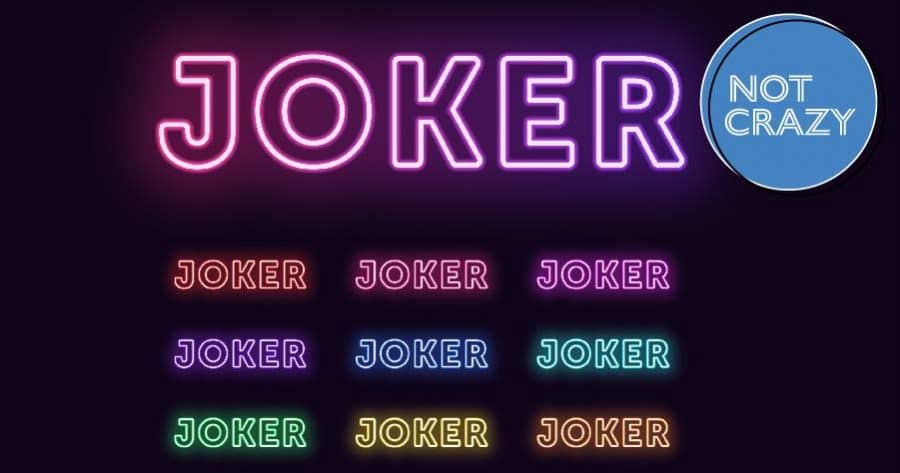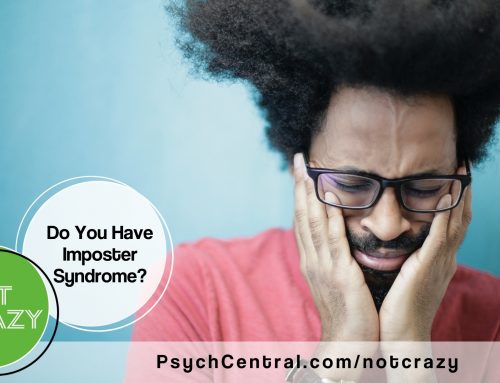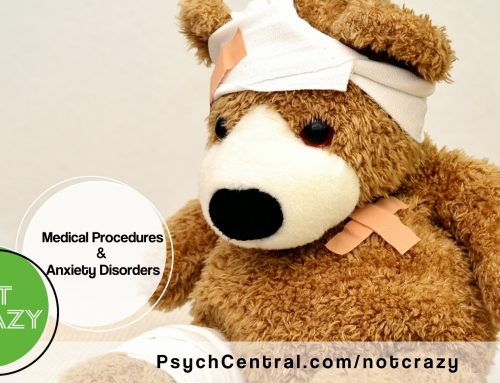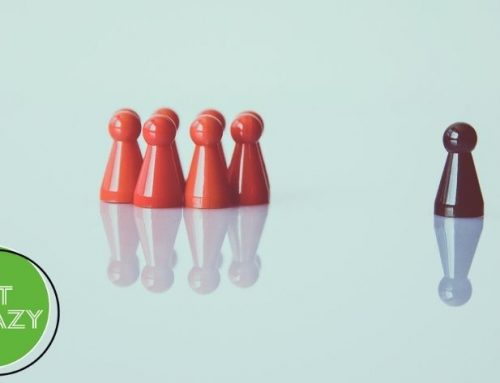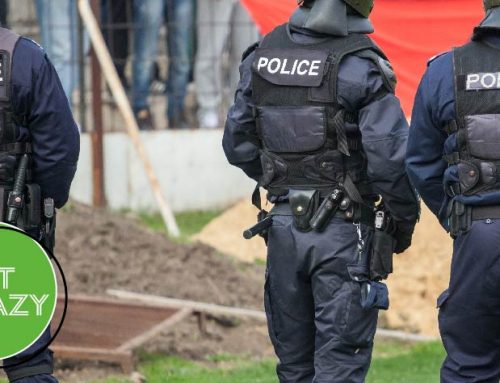Did the movie Joker portray mental illness correctly and does it matter? We passionately go over the movie Joker from the lense of people living with mental illness and discuss whether or not there are implications of making a movie like this. Does it help us or hurt us? What if it does both? Listen in to hear Gabe’s freakishly good recollection of scenes from the movie as Jackie struggles to separate entertainment from reality.
Spoiler Alert: You don’t need to see Joker to appreciate this conversation but we do go over the plot and reveal some important scenes from the movie.
SUBSCRIBE & REVIEW
About The Not Crazy Podcast Hosts

Gabe Howard is an award-winning writer and speaker who lives with bipolar disorder. He is the author of the popular book, Mental Illness is an Asshole and other Observations, available from Amazon; signed copies are also available directly from Gabe Howard. To learn more, please visit his website, gabehoward.com.

Jackie Zimmerman has been in the patient advocacy game for over a decade and has established herself as an authority on chronic illness, patient-centric healthcare, and patient community building. She lives with multiple sclerosis, ulcerative colitis, and depression.
You can find her online at JackieZimmerman.co, Twitter, Facebook, and LinkedIn.
Computer Generated Transcript for ‘Joker Movie and Mental Illness’ Episode
Editor’s Note: Please be mindful that this transcript has been computer-generated and therefore may contain inaccuracies and grammar errors. Thank you.
Announcer: You’re listening to Not Crazy. Here are your hosts, Gabe and Jackie.
Jackie: Welcome to Not Crazy. I’m here with my co-host, Gabe Howard, who is on a personal mission to eradicate pumpkin spice, anything from the world. He also lives with bipolar.
Gabe: And I’m, of course, here with Jackie Zimmerman, who is on a personal mission to drink and eat all of the pumpkin spice latte flavored, god awful garbage she can find. And I think that that contributes to her depression.
Jackie: I think not. But OK, agree to disagree. Whatever.
Gabe: I mean, denying it is the kind of thing that a millennial would do when being called out about pumpkin spice. Anything you will defend pumpkin spice and UGG boots until you die.
Jackie: Oh, I don’t even own UGG boots. Thank you very much.
Gabe: They have ugh in the title. How did they become popular?
Jackie: It’s fair. Ugggh.
Gabe: We saw Joker.
Jackie: We did. We saw it separately, but we did see it. I saw it on Saturday and immediately sent you a text that said, “have you seen this”? Because we need to talk about it.
Gabe: And I wrote you back and said, “I’m going to see it on Sunday. Why?” And then you didn’t answer any text for 24 hours. And I was like, OK, this is gonna be good because… So first off, you know, spoilers, content, warning, we’re going to talk about Joker. It is a rated R film. There is violence in the movie. And of course, there are spoilers. So it’s gonna get real.
Jackie: We will refrain, however, from talking about the Batman aspect of the movie and just stick to the mental health issues within the movie.
Gabe: I mean, that is fair, we’re not a pop culture show, we’re a mental health show.
Jackie: Oh, but if we were, I’d be so good at it.
Gabe: I just have so much to say about the movie as a huge Batman fan. But let’s start on the mental illness aspect. They really dove hard into Joker being severely mentally ill. We weren’t, what, 15 minutes into the movie when he was sitting in a social workers office being prescribed seven medications, talking about the medications, talking about voices in his head and talking about being severely mentally ill. It wasn’t subtle. It was right there.
Jackie: Gabe, for those of us who are not uber nerds about this stuff, does the Joker origin story include any of this mental health? Or is this just purely for this purpose of this movie they added in the mental health aspect? Like because Joker isn’t historically a mentally ill person. Right?
Gabe: We don’t know.
Jackie: Ok.
Gabe: The Joker has no origin story. I think that you would be hard pressed to find a reasonable person that wouldn’t describe the Joker as a maniac or maniacal. And of course, every time Batman catches him in the comics, he goes to Arkham Asylum, which is a mental hospital. So you’d be hard pressed to say that the Joker doesn’t have strong origins living with mental illness when he goes to a hospital for the criminally insane.
Jackie: Ok. That is helpful.
Gabe: Also, he kills people and laughs about it for sport. That’s kind of crazy.
Jackie: Is it, though? So you just said that and a lot of people left that movie thinking, hey, guess what? Mentally ill people perform acts of violence and laugh about it because they’re crazy. Is that true?
Gabe: It is true. It’s just not common. It’s like asking the question, do wives kill their husbands? What’s the honest answer to that question?
Jackie: I mean, some do.
Gabe: Exactly. Exactly. It is possible it has happened, but it’s extraordinarily rare. Right? The majority of wives are not killing their husbands.
Jackie: So you’re saying that the majority of mentally ill people never rise to this level of violence?
Gabe: Yeah, that’s exactly what I’m saying, and in fact, the majority of mentally ill people will never do anything violent, especially, you know, murderous Joker level violence. The fact remains that some people with mental illness will be violent.
Jackie: Some people with mental illness will be tall. Some people with mental illness will have red hair. Oh, I’m talking about you here. But yes, I mean, any group of people, any…
Gabe: Yes, violence is well-represented across everything, literally everything. We have religious figures that are violent. We have teachers who are violent. We have a podcast co-hosts who are violent. And on and on and on. There is no predictor of violence except, of course, for past violence.
Jackie: The takeaway, though, is that, like you said, it’s not an all or nothing thing. It’s yes. Some people with mental illness may be violent, but not all of them. And I feel like we have to do a shout out to Michelle here with her “Mentally Ill and I Don’t Kill” shirts, because that’s what I kept thinking in this movie. I couldn’t separate the movie from reality. This feels very timely, but not in a great way that helps the cause of mental illness advocates where it basically just confirmed what society is saying right now. Oh, yeah, all those crazies, they’re gonna go kill people.
Gabe: But remember, we have to respect the movie, right? You can’t pick and choose what part of the pop culture bullshit is factual and what
Jackie: Right.
Gabe: Parts of the pop culture bullshit is fake. What happened in the first half of the movie before Joker went, pardon the pun, insane.
Jackie: My big takeaway was he lost his access to treatment, therapy, medication, and had a lot of life changing transitions, like he lost his job. Basically, his life crumbled as he knew it.
Gabe: Right. Massive budget cuts, massive budget cuts. In the beginning, we saw him with a social worker, with a job, with medication, with societal aids and supports. And before anything went even remotely wrong, the government came in and cut everything. Lost his social worker, lost his medication. He lost his job. He lost social supports. Everything started immediately crumbling for this man. And I’d like to point out, and this is this is very, very important. Through absolutely no fault of his own. It showed him showing up for every appointment on time. It showed him doing the homework that the social worker prescribed. It showed him filling the prescriptions, taking the medication, going to work. Being honest at work. He did everything right. And society shit on him.
Jackie: That’s so true, and I didn’t even put those pieces together, at least not the complete way that you just did. Right? I saw him going to therapy. I saw him talking about getting his meds. And he had this journal that she asked him for. So you’re right. He was doing everything right. And it all ended by no fault of his own. You’re right. I don’t know. I guess when you look at it that way, are you saying that if all these things get removed from people with mental illness, they’re all going to turn out the same way Joker did? If we all lose access to our therapy and medication?
Gabe: Of course not. Obviously, no. Just like I am not saying that every single soldier will develop post-traumatic stress disorder from being in a war, but some do, and we can’t ignore this possibility. The reality is, is that the majority of people in Joker’s situation, they won’t become violent. They’ll become homeless. They will die in the elements. They won’t be able to get help. They’ll be arrested. They’ll end up in prison. Every bad thing that can happen will befall them and nobody else. Which is why nobody cares about them, because we just walk past homeless people or people in prison and we decide it’s their fault. But again, we can only use the movie. Remember that the movie is our backdrop. This isn’t America. This is the America in the movie.
Jackie: But can you really separate them? If we look at just the movie, I kept talking to Adam afterwards. I was, you know, talking very aggressively with my hands after we left because I had so many feelings where if you look at the movie, just the movie, the movie is a good movie, right? I mean, Joaquin Phoenix is stellar. The cast is great. Even the plot line is good. But I can’t look at this movie and not look at it as a commentary for what’s happening now. So I’m really struggling with this. I know that we should say this is just a movie. I know this is a movie. I know that it’s just for entertainment purposes. But I’m still really having a hard time separating it from what’s happening in the world right now. Like I said, a little bit of the too soon. Is this the right time for this movie? Is the right time for this story? Because it feels like all it’s going to do is just escalate the issues that we’re currently seeing. And we’re already seeing some of that in the media of people talking about the implications of this. But nobody’s actually talking about what this means for people who are mentally ill and how the rest of the world perceives them.
Gabe: Speaking as somebody who lives with bipolar disorder, who has had psychosis, who has been in a psychiatric hospital. There are parts of this that hits close to home for me. Right? I know that the reason that I am doing so well is because my access to care never got cut off. I also know that I’m doing so well because my family doesn’t suffer from serious mental illness. Remember in the movie, his mother was also seriously mentally ill and he was her primary caregiver because she was elderly and they lived in poverty and he was actively hallucinating and nobody seemed to notice or care that this was going on. His escalation was not immediate. His escalation was slow. And I think that some people might listen to this and think, man, Gabe, you really sound like you’re saying that this is reasonable. I’m not. I’m not saying that it’s reasonable. I’m saying that it’s not unexpected. It’s not so far outside of the norm that we shouldn’t be afraid that this wouldn’t happen just because something is incredibly uncommon, like, oh, I don’t know, murder. Murder is incredibly uncommon. Yet everybody lives in constant fear that it will happen. Well, a person with mental illness not getting resources and ending up violent is incredibly uncommon, but it’s not unexpected. It is one of the potential outcomes of denying basic human dignity, resources and care to people living with mental illness. So if we are looking at it as social commentary, why is that not the social commentary? That this city just abandoned its most vulnerable members?
Jackie: Well, the best part about that is Michigan is literally doing that right now. They are removing funds from therapists and they’re not allowing certain people to give diagnosis and medications anymore. This is happening. This is relevant right now. And I wonder in this movie, do you think that a turning point was when his coworker gave him that gun? Right? If we have this whole story and he doesn’t have that gun, does he go the route of what we’re saying, where basically he’ll probably end up homeless at some point because he’s already lost his job. His mother, who we said also has mental illness, is not contributing financially to the household. So at some point, without that gun, which becomes the catalyst for literally the entire movie, does he just become another statistic of people who are mentally ill, who then become homeless?
Gabe: We’ll be right back after this message from our sponsor.
Announcer: This episode is sponsored by BetterHelp.com. Secure, convenient, and affordable online counseling. Our counselors are licensed, accredited professionals. Anything you share is confidential. Schedule secure video or phone sessions, plus chat and text with your therapist whenever you feel it’s needed. A month of online therapy often costs less than a single traditional face to face session. Go to betterHelp.com/PsychCentral and experience seven days of free therapy to see if online counseling is right for you. BetterHelp.com/PsychCentral.
Jackie: We’re back talking about mental illness and how the movie Joker has portrayed it.
Gabe: I am a Star Trek fan.
Jackie: I am not.
Gabe: Well, I am. And there is a scene. And, you know, honestly, it’s been so long since I’ve seen it, I don’t remember if it’s Captain Kirk or Captain Picard, but one of them has this ability to go back in time and change something that they regret. And they do. And of course, invariably that’s the one thing that led them to greatness and made them the great captain that they ended up becoming. I like stories like this because I think that it does illustrate that there are small moments that make us who we are. I don’t know if this guy would have found violence in some other way, but I do know that again, in the context of the movie, he got an unregistered, illegal firearm. It was given to him by somebody that encouraged him to use it in a not safe manner without any training. And then he was allowed to walk around with this thing unchecked, and nobody seemed to notice it until such time that he was attacked through no fault of his own, used it as self-defense. And that made him feel powerful.
Gabe: It made him feel powerful. And speaking purely as somebody who has felt powerless and lost and scared, I am going to do anything to take that power back. So I got to wonder, if Gabe Howard all the way back when he was his sickest would have been handed a gun, could this have happened to me? I really, really want to say that absolutely not. Unequivocally, no. But I lived in a very suburban world. I had people looking out for me. And listen, nobody handed me something dangerous. And I don’t want this to turn into some gun control debate. We are not criticizing guns in any way. I feel the need to say that because I want people to focus on the point of people who are desperate and seriously mentally ill and hallucinating should not have firearms.
Jackie: No, and the idea of this character we’re talking about Joker here, is it was part of the perfect storm. Right? The loss of funding, the less medication, the loss of his job, plus the addition of being given this weapon created the perfect storm, which resulted in an incredibly violent person doing terrible things in his city.
Gabe: Another question that we have to ask and again, I know it’s Joker and you know, it’s fascinating that we have created potential social commentary out of what is a comic book movie. This is not a documentary. This isn’t even real life. The movie takes place in a world where eventually a man dresses up like a bat and chases people. So we have to keep this in mind. This isn’t reality, but there is some data to mine here. And I can’t help but wonder if some of the people with mental illness who have become violent had similar experiences. The poverty, the lack of resources. The social worker said the very last time that she saw her patients, “Nobody cares about you. Nobody cares about me either. Society doesn’t care about people like us.” And that was a big moment for me because I sat there in the audience as Gabe Howard, a person living with mental illness and thought, yes, that is accurate. That is 100 percent true. Society does not care about people like me.
Jackie: Are you taking notes when you were watching this because your recollection of what happened in this movie is so good? That was really like poignant when it happened because I remember her saying that and thinking, oh, shit, like, that’s that’s real. That’s real in this movie. That’s real in real life. But I just want to.. Props to your memory.
Gabe: But I remember things that really give me an emotional response.
Jackie: Like comic book movies?
Gabe: Like comic book movies. Yeah. Listen, I am a 12 year old boy at heart and comic book movies are absolute escapism for me. And let’s touch on that for just like a really tiny nanosecond. I go to these movies because I need a break. I need a break from my brain. I need a break from the harshness of life. I need a break from work. And I need a break from the same thing that everybody else needs a break from, just
Jackie: But did this movie do that for you?
Gabe: Not even remotely.
Jackie: I wouldn’t think so.
Gabe: All I could think of was, wow. Yeah. Yeah. Look, I don’t want to give away anything in the movie. There’s obvious exaggerations in this movie. There are obvious things that that Joker was able to do that you could just not pull off in real life. You know, there was a couple of parts where I was like, please, they’d catch this guy in a nanosecond. What do you mean the police can’t catch him? Obviously, that can’t happen.
Jackie: I agree with you. After the first act of violence, after that train scene, he would have totally been caught after that.
Gabe: Yeah, yeah. Yeah. That the movie realistically should have ended there and not have been able to progress. But it did progress. And again, we have to use the movie. Apparently, Gotham police are unable to…
Jackie: They’re the worst.
Gabe: They really are the worst.
Gabe: They even, they suspected him almost immediately. But he was still able to go on this this impressive crime spree all the way through the end of the movie without anybody stopping him or following him or doing anything about it. And he used the same gun the entire time. Like, just, man, he hung on to that thing.
Jackie: We’re talking about the same police force that relies on a masked crusader when they’re in, you know, they put a light in the sky and they go, hey, help us because we suck at our job. So I don’t think we can really talk about the efficacy of the Gotham Police Department in terms of how good they are at their jobs.
Gabe: Yet I think it’s important just to consider that this is a nuanced conversation, not the Joker movie violence, mental illness. What makes people go bad? And one of the reasons that I’m so against the message that people with mental illness are never violent is because if you bury your head in the sand and pretend that people with mental illness are never violent, you’re never going to be able to prevent it. You’re never going to be able to give people the care and the resources and the time that they need to make sure that this doesn’t happen. And when somebody with a mental illness has a violent outcome, there are so many so many lives ruined. The person who is mentally ill, their life is ruined. Their victim, obviously, obviously, the victim’s family, the family of the person with mental illness. Society that has to watch this. We can’t just turn a blind eye and pretend that it never happens just because it is incredibly rare. In the case of the movie Joker, clearly, obviously mentally ill and it.. he didn’t have the resources and they cut his resources and no, nobody cared. Nobody cared.
Jackie: Fuck. This is so sad. Just the movie itself, if you look at the character of Joker, right, you remove who he is at the end, right. And you look at the buildup to his whole life of how he’s been, who he is, who he’s become. You get a little bit of this history, but not a lot of it. But he was adopted. He grew up in the system. His mother, who we know is mentally ill, she had an abusive boyfriend. You look at his whole life story and then you top it off as an adult, all these things, these terrible things happen to him as an adult. It is a devastating life that he has lived. And if you make him a real person, which I know we’re not doing, but if we look at the outcome, like we said, of real people in the real world, the people who become homeless when they’ve had some of these similar things happen to them, it is devastating. It’s so sad how we treat these people, how we don’t care about them, how we cut their funding and then just go. Sucks to be you. Whatever. I’m having a hard time articulating how devastating it is. Thinking about this because it is a movie. But what happened to him? His life is not a thing that’s never happened. People have had the same upbringing as he has.
Gabe: And I think that we all get hung up on the idea that it was so incredibly preventable.
Jackie: Yeah.
Gabe: I know we don’t need to keep saying that it’s a movie, but in the movie, the Joker’s crimes led to massive loss of life, literal riots in the street. I mean, just pandemonium over an entire city. And in the big end, the scene when all of the city was just literally on fire at this point, all I could think of is, wow, that looks a lot more expensive than probably what the social services budget was. Wow. That was a, that was a, that was a good decision there. Yeah. Yeah. Mass savings.
Jackie: All I could think when I saw that scene was we are not above this right now. Again, can’t separate it from real life because that’s who I am as a person, even though I’ve tried. I’m watching this person who’s committed these atrocious crimes being celebrated by lots of other people who get to even wear masks to hide who they are to the rest of the world to also commit atrocious crimes. And they’re all having the time of their lives and I’m just watching this going, again, a little too close to home. I don’t know. Seems like it could happen tomorrow. Basically.
Gabe: Obviously, I don’t want to fundraise or advocate on the idea that if you don’t give people with mental illness, resources and money, we will burn the country down. That just sounds so awful and I don’t want that to be our message. But I have to tell you the message of please stop abusing the vulnerable and the mentally ill and the sick because this is atrocious and we are supposed to be better than this isn’t working. That message is not working. I don’t want to use this other message. I don’t like this other message. I don’t want people to be fearful of me. I want to be able to get a job. And I don’t want people to wonder when I’m going to snap and come in and shoot the place up or blow it up or set it on fire or, you know, paint my face with makeup. I don’t know. But it’s just so sad. The richest country on the planet, we’re supposed to be a Christian nation. We’re supposed to love our neighbors and care for one another. But in the meantime, we’re literally cutting services to sick, desperate, impoverished, vulnerable people every single day. More and more people are being stored, they’re being stored in prisons and state hospitals and jails and in and out of drop-in centers. And nobody cares. Nobody cares. This movie probably does show the worst-case scenario. But we’re on the path.
Jackie: Do you think that movies like this are hurting the cause? Or do you think that the cause is already fucked so the movie doesn’t change anything?
Gabe: Realistically, it’s absolutely hurting the cause. It’s making people with mental illness look violent and problematic and horrific. I like this movie, though, because it does actually show that there was no safety net. It showed that he was med compliant until they stopped giving him his meds. I like that I’ve seen all over social media for the last couple of weeks the note that Joker wrote in his notebook, which I’m paraphrasing now, which it said the problem with being mentally ill is everybody expects you to behave as if you aren’t. And that really spoke to me, spoke to me a lot. I’m sorry, it came from a psycho villain, but it’s true. The problem with being mentally ill is people expect you to behave as if you aren’t. And that’s impossible, especially without resources. But yeah, I think that people are simple. And I think that the simple message that people are going to carry is see, we told you people with mental illness were violent. This proves it. Even though it’s a frickin’ Batman movie. Come on.
Jackie: Well, this is why I think we can’t separate the movie from the world we live in right now. Yes, it’s entertainment. Sure. Anything goes in movies. But with the current climate around mental illness, around gun violence, around mentally ill people being violent, I just don’t think that we can separate them.
Gabe: Society probably can’t. We do get a lot of our mental health, knowledge and information and education from pop culture, which is stupid, and I really wish everybody would stop it. But to your point, Jackie, that is where people are learning it. So I guess we need filmmakers to make more accurate portrayals of mental illness. And I’m having a hard time, a really hard time defending the fact that the Joker isn’t accurate. I think it’s pretty accurate.
Jackie: I know because what happened to him at the end was not accurate, but the lead up his whole life. You know that all the things we’ve reiterated 500 times already. It is accurate. So did the filmmakers do a good job? Yes. Did they turn it into a movie for entertainment purposes? Yes. So what’s good and what’s bad? Did it do just as much good as it did bad?
Gabe: That’s really hard to say, and I don’t know, it’s gotten people talking about it. I have seen a lot of memes on Facebook, a lot of conversations on social media. People have asked me about it. So in this way that I think it’s good. But, you know, for every person that asks an intelligent question, that wants an intelligent answer, there’s 100 people in a mob that are just like, see, we told you so. There was a fictional movie in my theater and we’ve now decided it’s real. And these are the things that, you know, help spread misogyny and racism and rape culture and toxic masculinity and make people not understand one another. There’s so much hatred and those flames are fanned, unfortunately, with fictional portrayals.
Jackie: It goes back to whatever we remember becomes the truth. So everybody remembers that. So that becomes what happened in real life. And I think that a lot of these fictional portrayals of people, whether they’re real people or they’re representing a class of people or a type of person, we remember these tropes. Like they’re stereotypes, and whether they’re there for a reason or not, whatever. We remember that people are going to remember Joker as a mentally ill character. And if they don’t know anybody in their life to help them erase that version of the truth or they don’t do any research or they don’t pay attention. That’s what they’re going to remember.
Gabe: I hope they remember that the Joker was a mentally ill person who was cut off from society, denied resources and abused by all the people around him before he snapped because that, that would be progress.
Jackie: Gabe, I feel like that’s a great place to wrap this up. Thank you, everyone, for listening to Not Crazy. I want to remind you that we do funny stuff at the end of the episode. So listen, all the way through to the end while you’re doing that, maybe like us on social media, interact with us, share this with your friends, send us some emails at show@PsychCentral.com. See you next week.
Announcer: You’ve been listening to Not Crazy from Psych Central. For free mental health resources and online support groups, visit PsychCentral.com. Not Crazy’s official website is PsychCentral.com/NotCrazy. To work with Gabe, go to GabeHoward.com. To work with Jackie, go to JackieZimmerman.co. Not Crazy travels well. Have Gabe and Jackie record an episode live at your next event. E-mail show@psychcentral.com for details.
This article originally appeared on Psych Central as Podcast: Joker Movie and Mental Illness.



